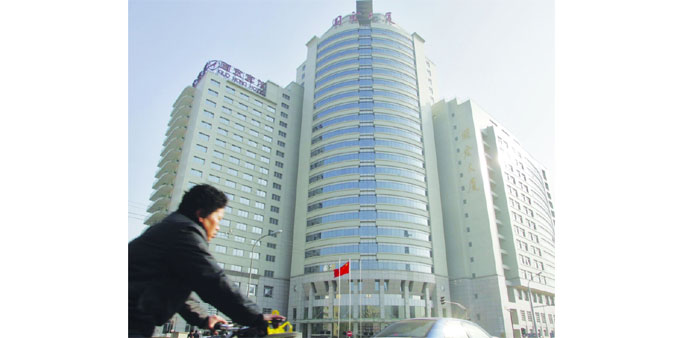The Guohong Building is seen in Beijing. Growth in residential property prices across large- and medium-size Chinese cities slowed further in March.
Dow Jones/Shanghai
Growth in residential property prices across large- and medium-size Chinese cities slowed further in March as lending limits and discounts undercut demand, according to analysts and property developers.
Average new-home prices in 70 of China's larger cities rose 7.3% from a year earlier in March, according to calculations based on survey data released on Friday by the National Bureau of Statistics. Prices rose 0.2% on a month-to-month basis, compared with about 0.3% in February.
The year-to-year rise in February was 8.2%, down from 9% in January. This slower growth rate over the past three months compares with accelerating prices in each month of 2013. In December, for instance, the average price rise was about 9.2% compared with 9.1% in November.
Excluding public housing, prices in March rose 7.7% compared with 8.6% in February.
China's housing market is an important pillar of growth in the economy. The construction, sale and outfitting of apartments accounted for nearly a quarter of China's gross domestic product in 2013, Moody's Analytics calculates. China's economy saw growth slip to 7.4% in the first quarter, an 18-month low, from 7.7% in the fourth quarter.
Property prices surged last year despite government efforts to control them. Since February, however, developers in some cities have been cutting prices to spur sales. A tighter mortgage market has also undercut sales, builders say, as banks remove discounts and take longer to approve mortgages.
"China can't achieve its growth target if the housing market is weak," said Michael Klibaner, China research director at property agency Jones Lang LaSalle, who called for easier bank-lending terms for genuine home buyers.
In smaller cities – many of which aren't covered by the survey – oversupply may result in price corrections and credit defaults, analysts said.
While developers said they are more bearish about sales and price growth this year than last year, they said they don't see any imminent collapse and expect authorities to intervene to prevent the sort of crisis that occurred in the US housing market in 2008.
"There are financial consequences of the oversupply of apartments," said Ronnie Chan, chairman of Hong Kong-listed property developer Hang Lung Group. "But I don't see it blowing up in our faces as it did in the US."
In recent weeks, reduced sales and falling prices have prompted some local governments to consider easing curbs imposed earlier to cool the market, including eligibility criteria for second or subsequent homes. Housing sales for the three months ended in March fell 7.7% to 1.11tn yuan ($178bn), according to official data.
Local media reported that authorities in Fujian province, the city of Changsha in central China's Hunan province and the cities of Hangzhou and Wenzhou in coastal Zhejiang province are considering adjusting property curbs to spur home sales.
"We're seeing local governments come up with ideas to loosen the curbs and test the waters," said James Macdonald, head of Savills Research China, a property consultancy. "At the moment, I don't think the central government has come out to refute or contradict these actions."
However, in China's most-developed cities, where demand is still strong, price growth remains stable.
Liu Haisheng, director of Shanghai's housing bureau, said on Thursday that the city isn't considering any fine-tuning measures but will continue to strictly carry out existing property curbs to rein in speculative demand.
Average house prices in Guangzhou rose 13.3% compared with a year earlier after jumping 15.7% in February. In Beijing prices were up 10.3% compared with 12.2% in February. Shanghai and Shenzhen gained 13.1% and 12.8% after rising 15.7% and 15.6%, respectively.

